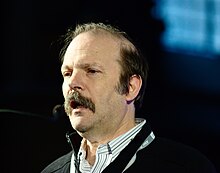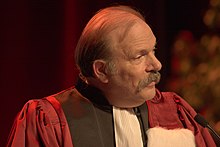Moshe Vardi
Moshe Vardi | |
|---|---|
 | |
| Born | 1954 (age 69–70) Israel |
| Alma mater | |
| Awards |
|
| Scientific career | |
| Fields | Logic Computation[2] |
| Institutions | Rice University IBM Research Stanford University |
| Thesis | The Implication Problem for Data Dependencies in the Relational Model (1981) |
| Doctoral advisor | Catriel Beeri[3] |
| Doctoral students | Kristin Yvonne Rozier |
| Website | www |
Moshe Ya'akov Vardi (Hebrew: משה יעקב ורדי) MAE ForMemRS[5] is an Israeli theoretical computer scientist. He is the Karen Ostrum George Distinguished Service Professor in Computational Engineering at Rice University, United States.[6][2][7] and a faculty advisor for the Ken Kennedy Institute.[8] His interests focus on applications of logic to computer science, including database theory, finite model theory, knowledge of multi-agent systems, computer-aided verification and reasoning, and teaching logic across the curriculum. He is an expert in model checking, constraint satisfaction and database theory, common knowledge (logic), and theoretical computer science.[9][10]
Vardi has authored or co-authored over 700 technical papers[2] as well as editing several collections. He has authored the books Reasoning About Knowledge[11] with Ronald Fagin, Joseph Halpern, and Yoram Moses, and Finite Model Theory and Its Applications[12] with Erich Grädel, Phokion G. Kolaitis, Leonid Libkin, Maarten Marx, Joel Spencer, Yde Venema, and Scott Weinstein. He is senior editor of Communications of the ACM, after serving as its editor-in-chief for a decade.[13]
Education
[edit]Vardi was an undergraduate student at Bar-Ilan University and received his Master of Science degree from the Weizmann Institute of Science.[4] His PhD was supervised by Catriel Beeri and awarded by the Hebrew University of Jerusalem in 1981.[3]
Career and research
[edit]Vardi's research interests are in logic and computation.[2] He served as chair of the computer science department at Rice University from January 1994 until June 2002. Prior to joining Rice in 1993, he worked at IBM Research and was also a postdoctoral researcher at Stanford University.[5] Vardi serves as an editor of several international journals[clarification needed] and was formerly a director of the International Federation of Computational Logic Ltd.[14] He has also co-chaired the Association for Computing Machinery (ACM) task force on job migration.[when?]
Awards and honors
[edit]Vardi is the recipient of three IBM Outstanding Innovation Awards, a co-winner of the 2000 Gödel Prize (for work on temporal logic with finite automata), winner of the Knuth Prize in 2021, a co-winner of the Paris Kanellakis Award in 2005, and a co-winner of the LICS 2006 Test-of-Time Award. He is also the recipient of the 2008 and 2017 ACM Presidential Award, the 2008 Blaise Pascal Medal in computational science[15] by the European Academy of Sciences,[16] the 2010 Distinguished Service Award from the Computing Research Association, the Institute of Electrical and Electronics Engineers (IEEE) Computer Society's 2011 Harry H. Goode Memorial Award, the 2018 ACM Special Interest Group for Logic and Computation (SIGLOG), the Distinguished Services Award from the European Association for Theoretical Computer Science (EATCS),[17] the European Association for Computer Science Logic (EACSL), and the Kurt Gödel Society (KGS) jointly sponsored Alonzo Church Award for Outstanding Contributions to Logic and Computation (with Tomas Feder). Vardi also holds honorary doctorates from eight Universities:

- Saarland University, Germany[5]
- University of Orléans[5]
- Grenoble Alpes University (UGA) in France[18]
- Federal University of Rio Grande do Sul (UFRGS) in Brazil[19]
- University of Liège in Belgium[20]
- TU Wien in Austria[citation needed]
- University of Edinburgh in Scotland[21]
- University of Gothenburg in Sweden[22]
Vardi is a Guggenheim Fellow, ACM Fellow, AAAI Fellow,[23] Fellow of the American Association for the Advancement of Science and a Foreign Member of the Royal Society (ForMemRS). He was designated a highly cited researcher by the Institute for Scientific Information, and was elected as a member of the US National Academy of Engineering, the National Academy of Sciences.[1][24] the European Academy of Sciences, and the Academia Europaea (MAE).[5] He was elected a Fellow of the American Academy of Arts and Sciences in 2010.[25] He was included in the 2019 class of fellows of the American Mathematical Society "for contributions to the development and use of mathematical logic in computer science".[26]
Personal life
[edit]Vardi lives with his wife Pamela Geyer in Houston, Texas.[17] His step-son Aaron Hertzmann[27] is also a computer scientist at Adobe Research.
References
[edit]- ^ a b "Moshe Y. Vardi: Computer and Information Sciences". nasonline.org. National Academy of Sciences.
- ^ a b c d Moshe Vardi publications indexed by Google Scholar
- ^ a b Moshe Vardi at the Mathematics Genealogy Project
- ^ a b "People of ACM - Moshe Y. Vardi". acm.org.
- ^ a b c d e "Moshe Y. Vardi". ae-info.org. Academia Europaea.
- ^ "Moshe Y. Vardi | Faculty | The People of Rice". profiles.rice.edu. Rice University. Retrieved 16 May 2023.
- ^ BOYD, JADE (July 22, 2011). "Rice's Moshe Vardi honored as Distinguished Service Professor". Rice University. Archived from the original on March 6, 2014. Retrieved April 10, 2012.
Rice University computer scientist Moshe Vardi has been named a Distinguished Service Professor, one of the university's most prestigious faculty appointments.
- ^ "People". Ken Kennedy Institute | Rice University. Retrieved 16 May 2023.
- ^ Moshe Vardi author profile page at the ACM Digital Library
- ^ Winslett, Marianne (2006). "Moshe Vardi speaks out on the proof, the whole proof, and nothing but the proof". ACM SIGMOD Record. 35: 56–64. doi:10.1145/1121995.1122008. S2CID 27479793.
- ^ Vardi, Moshe Y.; Fagin, Ronald; Halpern, Joseph; Yoram Moses (2003). Reasoning About Knowledge. Cambridge, Massachusetts: The MIT Press. ISBN 0-262-56200-6.
- ^ Weinstein, Scott; Erich Gradel; Kolaitis, Phokion; Leonid Libkin; Maarten Marx; Spencer, Joel H.; Vardi, Moshe Y.; Venema, Yde (2007). Finite model theory and its applications. Berlin: Springer. ISBN 978-3-540-00428-8.
- ^ Vardi, M. Y. (2012). "Artificial intelligence: Past and future". Communications of the ACM. 55: 5. doi:10.1145/2063176.2063177.
- ^ "INTERNATIONAL FEDERATION OF COMPUTATIONAL LOGIC LIMITED people". find-and-update.company-information.service.gov.uk. London, UK: GOV.UK. 26 March 2019. Retrieved 16 May 2023.
- ^ "THE BLAISE PASCAL MEDAL 2008 (section: "Blaise Pascal Medal in Computational Science")". European Academy of Sciences. Archived from the original on March 4, 2017. Retrieved April 27, 2017.
Professor Moshe Y. VARDI, USA / In recognition of his outstanding contributions in several areas of computational science connected by their use of logic as an underlying methodology. His work has had fundamental and lasting impact on automatic verification, logic of knowledge, database theory, and finite-model theory
- ^ "Does automation doom workers?". (George R. Brown School of Engineering at) Rice University. October 31, 2016. Archived from the original on April 29, 2017. Retrieved April 27, 2017.
the 2008 Blaise Pascal Medal for Computer Science by the European Academy of Sciences
- ^ a b Samuels, Jeanne F. (14 March 2013). "Jewish Herald-Voice". The Portal to Texas History. No. 54, Vol 105. Houston, Texas: University of North Texas Libraries. p. 17. Retrieved 16 May 2023.
- ^ "Vardi awarded honorary doctorate by Université Grenoble Alpes". rice.edu.
- ^ "Doctor Honoris Causa to Professor Moshe Vardi". ufrgs.br. 21 March 2016.
- ^ "L'ULiège honore 10 personnalités internationales et ses nouveaux diplômés docteurs (avec thèse)". Université de Liège. 16 March 2017. Retrieved 26 August 2022.
- ^ "Moshe Vardi - Humans, Machines, and Work: The Future is now". ed.ac.uk.
- ^ "Moshe Y. Vardi has been appointed honorary doctor at The IT faculty". gu.se. 23 April 2020.
- ^ "AAAI Fellows". aaai.org. Association for the Advancement of Artificial Intelligence.
- ^ "National Academy of Sciences Elections", Mathematics People, Notices of the American Mathematical Society, 62 (7): 826, August 2015.
- ^ Rice's Moshe Y. Vardi elected fellow of American Academy of Arts and Sciences.
- ^ 2019 Class of the Fellows of the AMS, American Mathematical Society, retrieved 2018-11-07
- ^ "Aaron Hertzmann: Principal Scientist, Adobe Research". toronto.edu.
- 1954 births
- Living people
- Hebrew University of Jerusalem alumni
- IBM employees
- Israeli computer scientists
- Israeli editors
- Theoretical computer scientists
- Israeli science writers
- Fellows of the Association for the Advancement of Artificial Intelligence
- 2000 fellows of the Association for Computing Machinery
- Fellows of the American Association for the Advancement of Science
- Fellows of the American Mathematical Society
- Formal methods people
- Gödel Prize laureates
- Knuth Prize laureates
- Members of Academia Europaea
- Members of the United States National Academy of Engineering
- Members of the United States National Academy of Sciences
- IBM Research computer scientists
- People from Haifa
- Rice University faculty
- Yeshivat Kfar HaRoeh alumni
